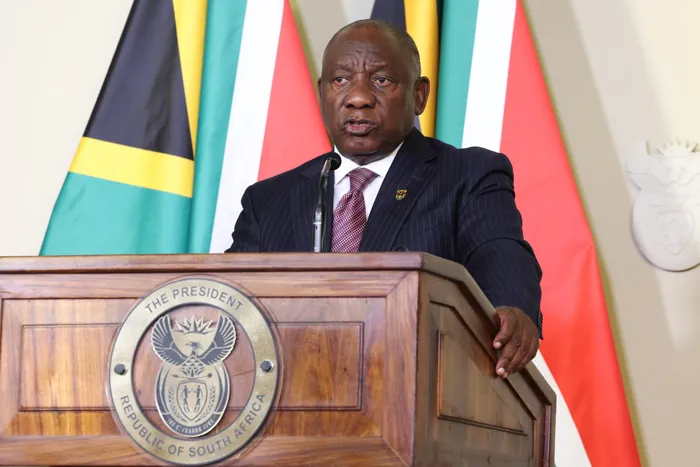South Africa’s budget shortfalls: a threat to national security and services

President Cyril Ramaphosa. Picture: Siyabulela Duda
The South African government is underfunding all important projects meant to take the country forward and provide better services.
The Border Management Authority (BMA), responsible for managing the country’s ports of entry, is grappling with a staggering R4.5 billion budget shortfall that threatens its operations over the next three years.
The Department of Basic Education suffered a R28.7 billion budget shortfall. During the 2024 Medium Term-Budget Policy Statement (MTBPS) Finance Minister Enoch Godongwana allocated an extra R376 million but offered nothing to save teacher posts.
In 2024, the Parliamentary Portfolio Committee on Defence and Military Veterans said the underfunding of the South African National Defence Force limited logistical support continued to put the lives of SANDF members at risk.
The South African Navy, responsible for protecting the country’s coastlines and marine resources, is also underfunded, and unable to do repairs and maintenance to its combat vessels and achieve its target of hours at sea.
Now, we have unemployed doctors taking to the streets over the government's failure to absorb them at various health institutions.
This list is endless. But, what is the cause of the below-inflation allocations to critical units meant to safeguard the country and improve livelihoods?
Economist, Professor Bonke Dumisa said South Africa does not have money and has to make a serious trade-off within difficult circumstances.
“The South African government has a debt of over R6 trillion. This means that the GDP (gross domestic product) ratio of 70%, goes to servicing the debt - not paying the principal amount owed. In simple terms, for every R100 the country makes, R70 goes into paying debt, and the remaining R30 is what’s being used for services. That is why we have an issue of underfunding across the board,” Dumisa said.
He added that the country pays R1 billion daily to service the debt.
“SA has been in junk status since 2018 because it is operating beyond its means. Those who downgraded the country said SA is an investment risk because if it is ever left unchecked it cannot fulfil its mandate. In fact, it can crash, and this has been seen with other African countries,” Dumisa said.
He added that people must start paying for services because the government cannot function without them.
“With Eskom, we have people who can afford to pay for electricity but don’t because they say ‘it is their human right’. So, when Eskom tries to disconnect those who don’t pay, they say they fought for freedom. They want to get everything for free,” Dumisa said.
“Where will the money come from to fund all these important projects if people are not paying?”
He said people have abused the constitution to the disadvantage of the country.
“96% of illegal miners are illegal immigrants, and we have people who approach courts to force the government to send necessities to illegal miners.
“On the other hand, slave masters are benefiting from illegal mining and pumping money to NGOs to masquerade as Human Rights organisations - to the detriment of the country,” he said.
He also said that politicians want salary hikes of 6.3% (across all political parties) while the country’s economic growth is below 1%.
Crime analyst and senior researcher at the Institute for Security Studies, Dr Johan Burger said underfunding, especially in the security cluster will negatively impact the country’s ability to protect its borders.
“We understand that people want a better life, but no country can afford to have people crossing their borders illegally,” Burger said.
It fuels xenophobia, due to cheap labour as locals feel that illegal immigrants are stealing their jobs, he said.
“Criminals use porous borders to bring in illicit goods, the example is the smuggling of cigarettes - which affects legit/legal businesses. Vehicle theft is also another problem. We have cars being taken across borders by criminal syndicates due to poor border control.
“The border fence needs to be fixed, but it looks like the government is not in a hurry to do so. The SANDF is not properly equipped. There is just a lack of funds across the board. Everyone is vying for more money to function properly and it looks like our fiscus is running out of money,” Burger said.
“The government should think very carefully about the availability of money in the country. If they keep on taxing people more, more and more people are going to leave the country,” Burger said.
Professor Siphamandla Zondi, a political analyst from the University of Johannesburg said part of the problem is that some good initiatives, priorities, and projects may be started for reasons related to political point scoring, political messaging and making a political point.
“So, we can announce a project and say we would have a smart city in South Africa within two years because that’s good political messaging. But we may say this, having not checked whether there is capacity to do this, what is needed, what finances are needed, and the system has to now try and fulfil a grandiose plan, a very ambitious and really nice plan, but that did not arise out of clear planning and stuff like that,” Zondi said.
He added that the government will then have to clear as many resources available and usually are never going to be enough.
“So, having discovered that politicians have announced a project which now worked out that it will cost R2 billion, but the government can only raise R800 million. It will come across as an underfunded project when actually it was not a project derived out of a careful calculation, including what resources are needed.
“But it had to be announced because it made political sense, or maybe it creates political currency to make it, which is one serious challenge.”
gcwalisile.khanyile@inl.co.za